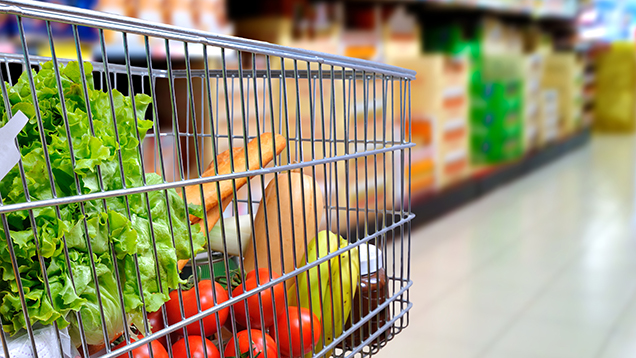Food industry makes Finland's first materials efficiency commitment

The food industry, trade and the packaging sector as well as three ministries made a commitment to reduce the environmental impacts of food production, distribution and consumption in 2019–2021.
The key content of this commitment published on 8 February 2019. Signatories of the commitment are the Ministry of Economic Affairs and Employment, the Ministry of Agriculture and Forestry and the Ministry of the Environment together with the Finnish Food and Drink Industries' Federation, the Finnish Grocery Trade Association and the Finnish Packaging Association.
Towards more sustainable food production, distribution and consumption
Companies joining the food industry's materials efficiency commitment aim to reduce food loss, promote more environmental friendly packaging, increase the recycling of food waste and materials, and improve the efficiency of logistics in goods transport.
The target for the first year is that the companies joining the commitment will represent 85% of the Finnish Grocery Trade Association members’ turnover and 20% of the Finnish Food and Drink Industries’ Federation members’ turnover. An additional target is that the 20 companies affiliated to the Finnish Packaging Association will join the commitment.
“The voluntary materials efficiency commitments are part of the National Material Efficiency Programme and facilitate Finland’s progress towards a circular economy society. Activities related to the commitment will promote dialogue between the industries and the administration. The objective is that, by working together, we can achieve and preferably exceed the set targets without mandatory regulation and that the materials efficiency commitments in the Finnish food industry will also spread to other sectors”, says Minister of Economic Affairs Mika Lintilä.
“By improving materials efficiency, we can save natural resources and reduce the food industry's environmental impacts. The joining companies can choose the most effective means of achieving the targets that are relevant to their operation. Improved materials efficiency will also translate as significant savings for the companies, while their work will help to achieve the UN’s sustainable development goals at the practical level”, notes Minister of Environment, Energy and Housing Kimmo Tiilikainen.
“I am happy that the food industry wishes to be a forerunner of corporate responsibility also in the area of materials efficiency. In total, 450 million kilograms of food loss in all stages of the Finnish food chain from primary production to the consumers, and Finland is committed to the goal of halving food loss by 2030. The commitment is a token of the goal-oriented cooperation through which this goal can actually be achieved”, stresses Minister of Agriculture and Forestry Jari Leppä.
“Plans to improve materials efficiency were launched several years ago as a joint initiative of the food industry and the trade sector. It is great to see this initiative now taking the concrete form of a commitment. We wish to be pioneers and promote materials efficiency through voluntary actions in cooperation with policy-makers, as is the case in the field of energy efficiency”, says Pia Pohja, Director General of the Finnish Food and Drink Industries’ Federation.
“When the food industry pulls together methodically, the consumers will have fresh food, losses will be reduced, materials will be recycled efficiently, and emissions will be minimised. The trade sector pledges to take practical actions to reduce the sector’s climatic effects and to support sustainable use of natural resources”, notes Kari Luoto, Managing Director of the Finnish Grocery Trade Association.
“Good packaging protects the product and reduces food losses. The majority of environmental impacts caused by food production are created in the primary production stage. If food goes off before it is consumed, the environmental impacts already caused are wasted. The environmental impacts of throwing out one slice of ham, for instance, are greater than those from producing the packaging. It is important to optimise the packing material use, ensuring that the product is sufficiently protected without excessive use of materials”, says CEO Mikael Svennas, a Board member of the Finnish Packaging Association.
Through its materials efficiency commitment, the food industry joins the national Society’s Commitment to Sustainable Development (www.sitoumus2010.fi). The commitment supports the achievement of the global Sustainable Development Goals (SDGs) through building resilient infrastructure, promoting sustainable industrialisation and fostering innovation (SDG 9), ensuring sustainable consumption and production patterns (SDG 12), and taking urgent action to combat climatic change and its impacts (SDG 13).
The goal is that the companies’ materials efficiency actions completed as part of the commitments will bring measurable benefits to the companies’ profitability, sustainable use of natural resources and the environment alike.
More information online:
Materials efficiency commitment website: www.motiva.fi/matsit/elintarvikeala
Brochure (in Finnish): Food industry’s materials efficiency commitment
Recording of the press release on 8 February 2019: www.vn.fi/live
For more information, contact:
Mika Honkanen, Ministerial Adviser, Ministry of Economic Affairs and Employment, tel. + 358 295 064 904
Taina Nikula, Ministerial Adviser, Ministry of the Environment, tel. +358 295 250 202
Petri Koskela, Senior Specialist, Ministry of Agriculture and Forestry, tel. +358 295 162 382
Esite: Elintarvikealan materiaalitehokkuuden sitoumus
Tiedotustilaisuuden 8.2.2019 tallenne verkossa
